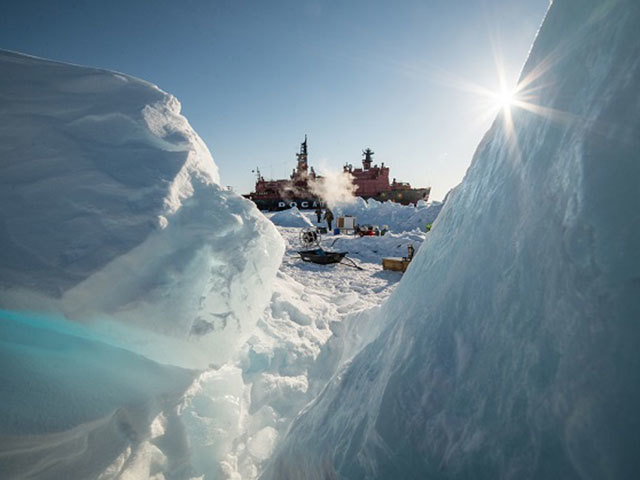
Russia’s financial crisis has become so severe that President Vladimir Putin found himself reassuring investors late last week that the government would provide the support needed to the world’s largest oil company.
With OAO Rosneft facing $21 billion of mostly foreign- currency debt maturities before April, Putin said the government will “definitely” help the company if necessary, according to an interview on the Kremlin’s website Nov. 14. After yields on Rosneft’s benchmark dollar bonds due in 2022 surged to a record 7.34 percent that day as oil sank to a four-year low, the statements may help restore investor confidence in the company, according to Commerzbank AG.
“Putin’s comments tried to reassure investors about Rosneft’s strategic importance,” Apostolos Bantis, a credit analyst at the German lender, said in a telephone interview from Dubai. “This should alleviate investor concerns of a default- risk scenario.”
Rosneft, which has more short-term debt than any other corporate borrower in Russia, is among companies locked out of global capital markets because of international sanctions tied to the conflict in Ukraine. With the sliding ruble feeding a shortage of foreign currency at home, the state-controlled oil producer’s credit rating envisages a “very high likelihood of extraordinary state support,” Elena Anankina, a Standard & Poor’s analyst, said in a Nov. 12 interview.
A Rosneft press official declined to comment when contacted by phone on Nov. 15.
Putin’s statement came three days after Alexei Kudrin, the former finance minister who designed Russia’s Wellbeing Fund, said Rosneft shouldn’t be allowed anywhere near it. Economy Minister Alexei Ulyukayev said on Oct. 29 that the company’s bid for more than $43 billion in state aid didn’t meet the fund’s requirements.
Rosneft may get state aid after an assessment, Putin said in the interview with Russian state news service Tass, which was distributed by the Kremlin’s press service. There’s “no hurry” as the company is in a good financial condition, he said.
While there is little risk that Rosneft won’t pay back its debt because it’s “too important for Russia,” its reliance on state hand-outs can turn off investors, according to Sergey Dergachev at Union Investment Privatfonds GmbH in Frankfurt.
“I am not a big fan of being invested in credits which are fundamentally poorly positioned and where you have to be relying on state funds,” Dergachev, who helps oversee $10 billion as a money manager at Union, said by e-mail on Nov. 14. “Stand- alone, Rosneft will have much more difficulty in a stressed- market scenario than its peers, and this is what I, as an investor in emerging-market debt, want to avoid.”
Rosneft, headed by long-time Putin ally Igor Sechin, has $10.2 billion in debt due this year and $19.5 billion in 2015, according to a company presentation on Oct. 29. Russia’s foreign-currency reserves dropped to a five-year low of $428.6 billion in October, with the Wellbeing Fund at $81.7 billion.
The company has more than $20 billion of available cash as well as backup credit lines of about $6 billion to help roll- over its debt pile, Moody’s Investors Service analyst Julia Pribytkova said by e-mail on Nov 12. Rosneft, which racked up debt for its $55 billion purchase of BP Plc’s TNK-BP joint venture in 2013, may also tap domestic lenders for $3 billion to $5 billion in bridge loans early next year, she said.
S&P, which rates the Russian company at BBB- with a negative outlook, its lowest investment grade and at par with the sovereign, said this grade already factors in potential state support because of “Rosneft’s importance for Russia as a large oil producer, a large taxpayer and employer, with very strong links to the government,” Anankina said.
The jump in Rosneft’s bond yields is fueled by investor wariness amid tumbling crude prices and concern the crisis in Ukraine will trigger new sanctions against Russia, Egor Fedorov, an analyst from ING Groep NV in Moscow, said by e-mail Nov. 14.
Penalties from the U.S. and the European Union, which accuse Putin of destabilizing neighboring Ukraine, are making it harder for Russian companies to refinance their debts, with corporate bond sales dropping 64 percent this year from the same period of 2013, according to data compiled by Bloomberg. While Putin denies he’s helping pro-Russian rebels in Ukraine, the ruble is down 30 percent in 2014, the biggest drop in emerging markets.
Putin left a G-20 meeting in Brisbane, Australia early after being told by fellow leaders to stop arming the separatists. The ruble weakened for a third day against the dollar, sliding 0.4 percent to 47.3675 as of 2:07 p.m. in Moscow.
“We do not foresee any difficulties with debt repayments in the near term” for Rosneft, Brigitte Posch, the head of emerging-market corporate debt at Babson Capital Management LLC in London, where she manages about $1.8 billion, said by e-mail on Nov. 14. “Primarily because of the state support.”
Recommended for you
